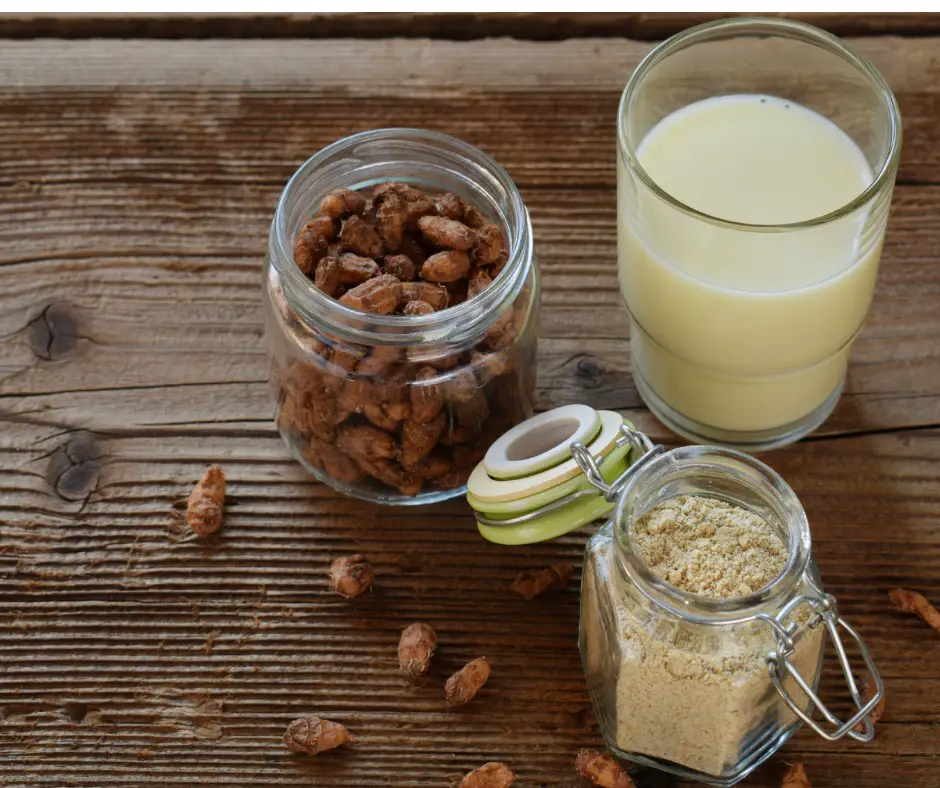One of the challenges of making tiger nut milk is that it can ferment easily and become undrinkable.
This can give the milk a sour taste and even make it unpleasant to drink.
In this article, we will discuss some tips on how to prevent tiger nut milk from fermenting.

Does Tiger Nut Milk Ferment?
You might be wondering whether tiger nut milk ferments after it’s made.
Uniquely, unlike most other milk alternatives, tiger nut milk has a knack for fermenting.
The fermentation of tiger nut milk results in a sour-ish flavor profile, which comes down to its natural constitution and the absence of preservatives.
The high sugar content within it creates an ideal environment for common bacteria that, unless eliminated through proper pasteurization and packaging, end up lingering in the milk.
These bacteria go on to consume the sugars present and convert them into different by-products.
Predominantly, they produce lactic acid which is what gives the fermented milk its characteristic sour taste.
So yes, tiger nut milk does indeed ferment if left unpreserved.
In fact, in many cultures, this fermentation process is intentionally encouraged to create traditional beverages with a tart kick!
Is Fermented Tiger Nut Milk Healthy?
You might have heard about the health benefits of fermented food and drink, but when it comes to fermented tiger nut milk, there’s a caveat.
When this plant-based milk ferments without any controlled process on its own, it isn’t advisable to consume it.
This is because we cannot be entirely sure of the types of bacteria that lurk within this natural product, despite lactic acid bacteria being typically involved in fermentation.
However, when crafted under careful supervision and using specifically introduced good bacteria for fermentation (as seen in horchata de chufa fermentada, a traditional Spanish beverage), the resulting fermented tiger nut milk can be packed with health benefits.
Some potential perks of enjoying properly fermented tiger nut milk include:
Boosting Gut Health: Probiotics are your gut’s best friend. These beneficial bacteria in fermented tiger nut milk can help balance your gut flora, potentially preventing or treating numerous digestive ailments like diarrhea, constipation, irritable bowel syndrome and inflammatory bowel disease.
Enhancing Immunity: Alongside probiotics, this milk also contains prebiotics which feed these good bacteria helping them grow and multiply. They form a powerful duo in bolstering our immune system and fending off nasty pathogens like E.coli, Salmonella and S.aureus.
Supplying Essential Nutrients and Antioxidants: Not only is it a flavorful delight but fermented tiger nut milk also serves as an abundant source of essential nutrients including calcium, magnesium, phosphorus, potassium, iron, zinc copper plus vitamins E,C and B. All these nutrients play vital roles in various bodily functions from bone health to blood pressure regulation to wound healing. Additionally they’re rich in antioxidants which offer cellular protection against oxidative stress caused by free radicals.
How Do You Prevent Tiger Nut Milk From Fermenting?
While tiger nut milk offers a plethora of health benefits, it has a natural tendency to ferment due to lactic acid bacteria that come along with the tiger nuts themselves.
No amount of washing can completely rid these tiny tubers of all their bacterial hitchhikers, meaning some will inevitably end up in your milk, initiating fermentation.
However, there are several ways to prolong the freshness of your homemade tiger nut milk before fermentation sets in:
Chill and Freeze: Keeping the milk refrigerated will extend its life span up to two days. Beyond that, move it to the freezer for longer storage, just remember to thaw it thoroughly before use.
Natural Preservatives: Consider using additions like citric acid or ginger juice. They act as preservatives inhibiting microbial growth and increasing shelf life. Keep in mind though – these ingredients can modify the taste profile of your milky drink.
Chemical Intervention: To further delay spoilage, consider using other preservatives like lime juice, pectinase enzymes and sodium benzoate. These can help reduce viscosity and pH levels thereby making conditions less hospitable for bacterial growth. However, understanding their usage amounts is crucial as they can significantly impact taste or even pose health concerns if used excessively (i don’t know how!)
Select Sterilization Techniques: If you’re open to more advanced methods of preserving freshness, sterilizing the milk through artificial techniques such as freeze-drying or packaging under inert conditions could be beneficial. These actions help kill or remove any existing microorganisms thereby prolonging milk quality.
Can You Boil Tiger Nut Milk?
Technically, you can boil tiger nut milk, but we don’t necessarily endorse it.
Boiling can have a number of unpalatable effects on the quality, nutritional value, flavor, and texture of your tiger nut milk.
High heat applied during boiling could potentially degrade some essential nutrients present in the milk and consequently alter its taste as well as its creamy texture.
On that note, tiger nut milk is best savored fresh and cold right out of the fridge or just slightly warmed if you prefer your beverages on the warmer side.

